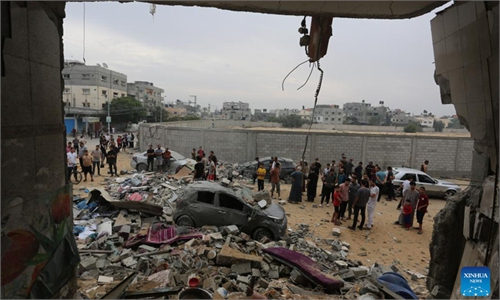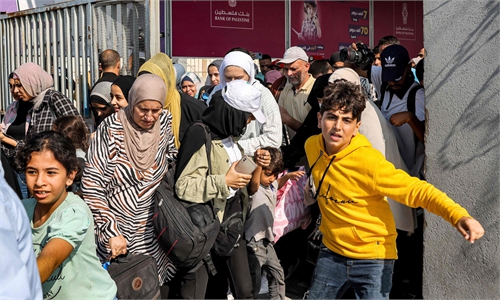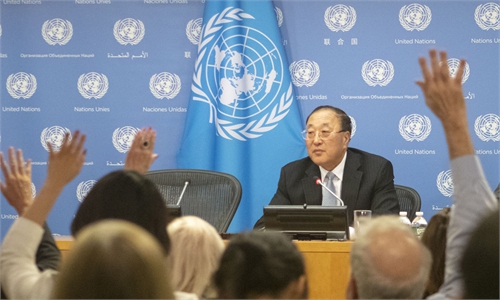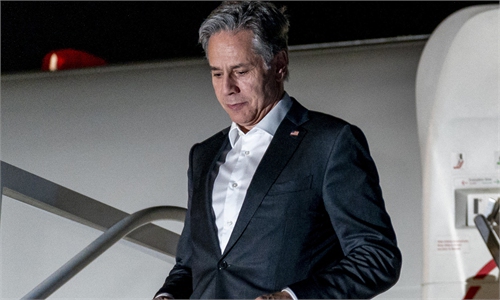US ‘slight change’ in attitude on Palestine-Israel conflict due to rising domestic, international pressure, ‘but unable to stop Gaza bloodshed immediately’
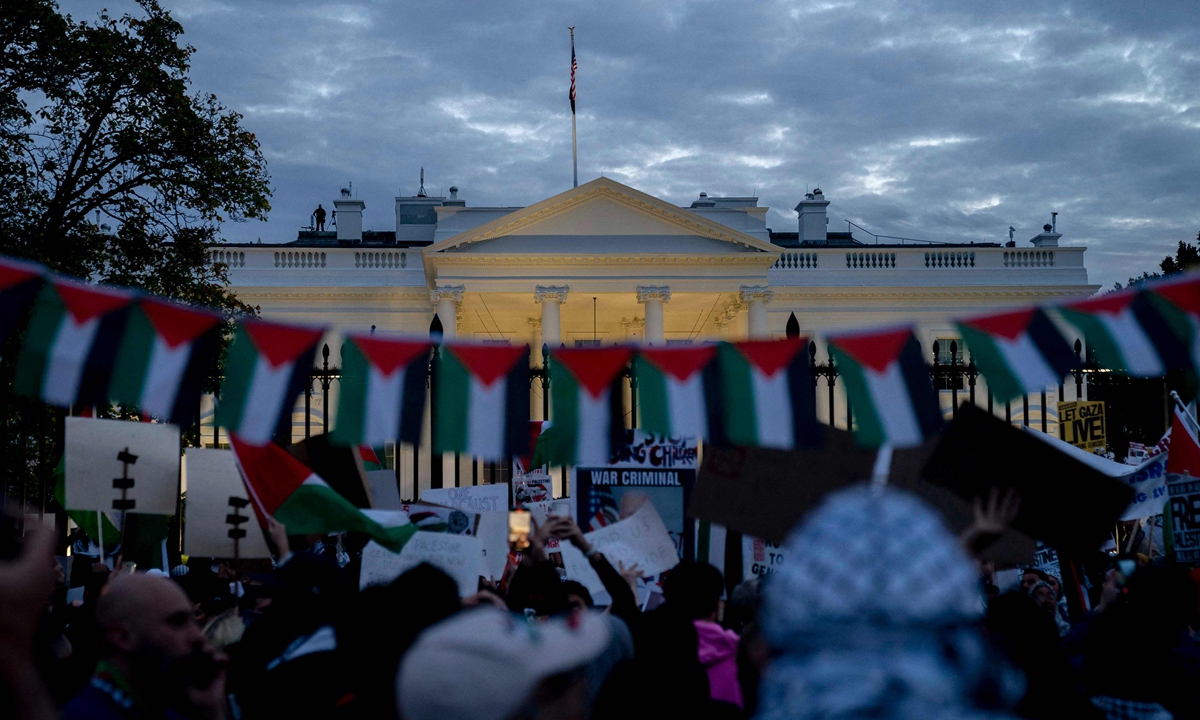
Demonstrators gather in front of the White House during a rally in support of Palestinians in Washington, DC, on November 4, 2023. Photo: VCG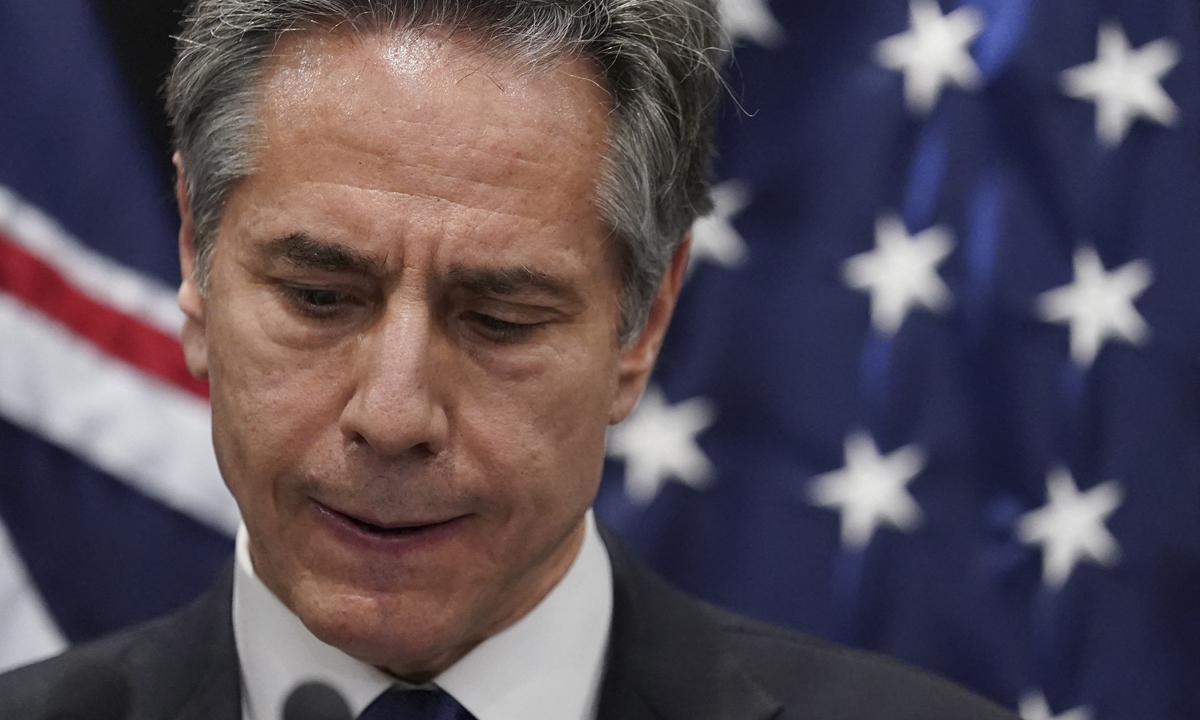
US Secretary of State Antony Blinken Photo: AFP
The attitude of the White House toward the Palestine-Israel conflict has seen a slight change in recent days compared to its firm stance to merely defend Israel's "right of self-defense" at the very beginning, as Washington now calls for "humanitarian pauses," Chinese analysts said on Sunday. They noted that although this comes as a result of mounting pressure from US voters and the international community, this kind of adjustment shows limited sincerity and effectiveness in being able to stop the horrific crisis which has already killed at least 9,500 people in Gaza.Tens of thousands of protesters who support Palestine and oppose Israel's military operations in Gaza marched through downtown Washington, DC on Saturday in what organizers hoped was the largest US demonstration of its kind since this round of the conflict started in early October, media reported.
Protesters carried placards with slogans such as "Palestinian Lives Matter," "Let Gaza Live" and "Their blood is on your hands." Protesters chanted "Biden, Biden, you can't hide; we charge you with genocide," as the US government continued to reject demands to add its voice to calls for a blanket cease-fire, media reported.
Before the protest, Washington has made slight adjustments in its tone. US President Joe Biden said he thought there should be a humanitarian "pause" in the Israel-Hamas war, after his campaign speech Wednesday evening was interrupted by a protester calling for a cease-fire. "I think we need a pause," Biden said, AP reported on Thursday.
During his latest visit in Jordan, US Secretary of State Antony Blinken reaffirmed Washington's position calling for "humanitarian pauses" in Gaza to protect civilians and allow foreign nationals to leave, Aljazeera reported on Saturday.
At the beginning of this round of the conflict, the US completely supported Israel to exercise its "right of self-defense," but after thousands of Palestinian civilians have been killed and even UN personnel, journalists, hospitals and refugee camps have been struck, Washington has been forced to adjust, in order to respond to pressures from the international community and US voters, and to prevent Arab countries like Jordan and Egypt from aligning themselves with Iran and Turkey, Sun Degang, director of the Center for Middle Eastern Studies at Fudan University, told the Global Times on Sunday.
According to the latest death toll on Saturday, Israeli bombardments in the Gaza Strip have killed at least 9,500 people, with well over half women and children, the government media office in the Gaza Strip announced on Saturday, media reported.
More than 40 percent of the dead in Gaza after nearly four weeks of war were children, the UN said, with 3,900 reported child victims, and another 1,250 missing and presumed buried under bombed buildings, the Guardian reported.
"The death toll in result of the Israeli aggression on the Gaza Strip since October 7 is 9,500, including 3,900 children and 2,509 women," Salama Marouf, head of the Gaza media office, told a press conference.
Although the death toll in Gaza is rising sharply day by day, the adjustment by the US is driven by its demand to preserve its global hegemony, and the Biden administration will not stop military and economic assistance to Israel. Its promise of protecting Israel will also not change, and these are key conditions for Israel to continue its operation in Gaza and ignore international pressures, analysts said.
Ma Xiaolin, senior professor and dean of the Institute for Studies on the Mediterranean Rim at Zhejiang International Studies University, told the Global Times on Sunday that the "humanitarian pauses" recently mentioned by Biden and Blinken is a term that the US is using to replace "cease-fire" or "humanitarian truce," a position between supporting Israel to continue its war in Gaza and responding to international calls for a cease-fire. The US does not want to be isolated by international community with Israel, Ma added.
Chinese analysts said the most sincere and effective way to realize an effective and sustainable cease-fire and stop the horrific bloodshed in Gaza is to let the UN Security Council pass a resolution calling for a cease-fire, and not to one-sidedly stand for Israel and defend Israel's killing of Palestinian civilians in Gaza.
Unfortunately, this is not what the US wants. According to the Times of Israel, Arab leaders decrying the mounting civilian death toll in the conflict pushed for an immediate cease-fire Saturday, but Blinken warned that "such a move would be counterproductive and could encourage more violence by the terror group," referring to Hamas.
US solution unreliable
Blinken made an unannounced visit to the occupied West Bank on Sunday and met with the Palestinian Authority President Mahmoud Abbas on his second visit to the region since the outbreak of latest round of conflict, Reuters reported.
During the meeting, Abbas told Blinken "there must be an immediate cease-fire to the war in Gaza," according to Abbas' spokesperson, adding to a growing chorus of Arab leaders stressing the need for a truce, Al Jazeera reported on Sunday, saying that the meeting between them lasted less than an hour. There were no statements at the end of the meeting from either party.
According to the Times of Israel on Saturday, earlier this week, Blinken told a congressional hearing, "At some point, what would make the most sense would be for an effective and revitalized Palestinian Authority to have governance and ultimately security responsibility for Gaza." Blinken will discuss this idea with Abbas.
However, Ramallah, for its part, has asserted it has no interest in returning to Gaza unless it is part of a diplomatic initiative that unites the enclave with the West Bank and revamps the peace process with Israel, an idea that would be supported by the Biden administration but has little backing in the current Israeli government, Israeli media said.
Chinese analysts said the US diplomatic efforts are unlikely to be effective in to stopping casualties and will also fail to convince Arab countries, including the Palestinian Authority because a "pause" is not a "cease-fire," and the US and Israel both prioritize "eliminating Hamas," rather than to avoiding killing civilians.
The US and Israel also want to differentiate Hamas from Palestine, by calling the conflict the "Israel-Hamas war," but this approach will not work, particularly as Gaza is also a part of Palestine's occupied territory, and Hamas is part of the military strength of Palestine as a whole, Ma said, noting that Gaza belongs to the Palestinian people from both Gaza and the West Bank, and now that nearly 10,000 Palestinians are dead, it is not just a war between Israel and Hamas, but another round of the Palestine-Israel conflict.
With this insincere attitude and unrealistic approach, the US' solution for the Palestine-Israel conflict is unlikely to succeed, experts noted.
Impact to US election 2024
The Guardian reported that signs of a split between traditional, pro-Israel Democratic party supporters and younger voters, including Arab Americans, over the Israel-Palestine conflict were made apparent in a speech by Nihad Awad, the national director at the Council on American-Islamic Relations.
"The language that President Biden and his party understand is the language of votes… and our message is: No cease-fire, no votes," Awad said, listing states that next year's presidential election could turn on. "No votes in Michigan, no votes in Arizona, no votes in Georgia, no votes in Nevada, no votes in Wisconsin, no votes in Pennsylvania."
Although the poor handling of the Palestine-Israel conflict has caused a drop in Biden's approval rating, to what extent this will impact the presidential election next year is in question, Lü Xiang, a research fellow at the Chinese Academy of Social Sciences, told the Global Times on Sunday.
Progressive forces, left-wingers and Muslim voters will be angry at Biden, but considering Donald Trump and his supporters are much more extreme in supporting Israel, letting Trump win will absolutely not serve their demand of calling for the US to help Palestine. This is why Biden is not very concerned about the protests at the moment as he believes they will vote for him eventually, Lü said.
There is a year to go before voters go to the polls in November next year, and the war in Gaza might not last for that long, so the impact might be limited, said analysts. But some analysts also consider that if some Biden supporters choose not to vote, it might impact the situation in some swing states.

